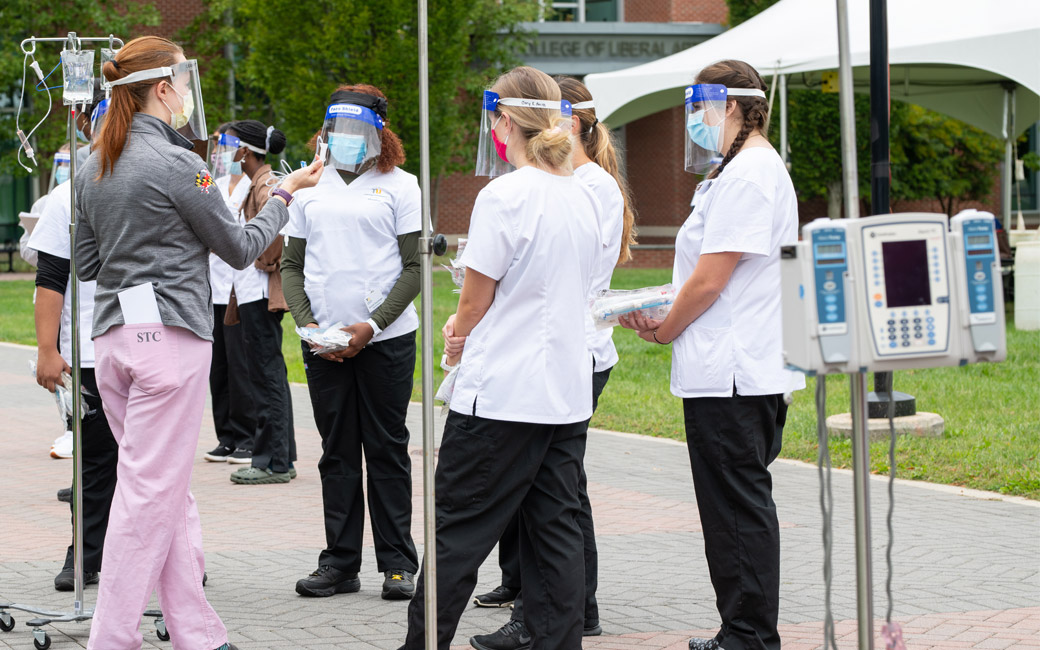An early exit to face the COVID-19 surge ahead for some TU students
'It's very satisfying to help in a time of crisis, when the state needs us'
By Cody Boteler on December 2, 2020

Two-thirds of this term’s TU nursing graduates will exit the program early, working in Maryland health care facilities during the latest COVID-19 surge.
Hayley Mark, chair of the Department of Nursing, says 51 graduates—or 66% of the winter Class of 2020—have opted to leave early.
Towson University’s robust nursing program ensures students are prepared to pass their licensing examinations and enter the health care field when they graduate. TU prepares and graduates more health care professionals than any other university in Maryland.
“The students are ready to work now,” Mark says. “They’re safe, and they’re competent. We would not let them exit early if we did not know they were ready.”
About 20 nursing graduates exited the program early last term.
In addition to required clinical rotations and classroom instruction, it is common for TU nursing students to get experience as nursing assistants before they graduate.
Because of TU’s location in greater Baltimore and relationships with partner institutions in the region, “well more than half” of TU nursing students graduate with some working experience, Mark says.
"We are very proud of our nursing graduates who are answering the call to assist our fellow Marylanders in this critical effort," says Melanie Perreault, provost and executive vice president for academic and student affairs. "Our students and faculty have done a tremendous job in preparing for an early graduation without compromising any standards of excellence."
The Maryland Institute for Emergency Medical Services activated a program that allows nursing students and other health care students in Maryland colleges and universities to join the state’s staffing surge capacity, according to Gov. Larry Hogan, who supports the initiative.
“It's very satisfying to help in a time of crisis, when the state needs us,” Mark says. “The students want to help. It's satisfying in that way too, allowing the students to get out early and offer their skills.”
Hogan’s emergency orders allow nursing graduates to work before taking the National Council Licensure Examination (NCLEX), Mark says. Towson University graduates boast a 90% pass rate on the NCLEX.
One of the graduates who exited early from Towson University is Stuart Barnett. Barnett says he's exiting early in part so that he can pick up more shifts working at a COVID-19 testing site in downtown Baltimore.
"It seems like they really need the help right now. It feels really good," Barnett says. "Nursing school has been rigorous, so it feels good to finish up and get out there to help people."
Jahzre Francis, a fellow early exit graduate, says she feels fully prepared to be a nurse through her time in Towson University's program, and that it's rewarding to "get started right away."
"The faculty were always very helpful. They take their time with their students. I've not had a single bad experience with any of the nursing faculty," Francis says.
It’s up to individual hospitals or health care facilities to decide whether students who exit programs early will work as a nurse or nursing assistant before they become licensed, Mark says.
In the undergraduate nursing major, students spend their first two years completing prerequisite courses and their final two years immersed in nursing-specific courses.
TU also offers degree completion programs for registered nurses or individuals who have associate degrees.
Nursing students earn clinical hours in some of the nation’s leading health care facilities, including The Johns Hopkins Hospital. Other partner institutions include Greater Baltimore Medical Center (GBMC) and the University System of Maryland St. Joseph’s Medical Center.
This story is one of several related to President Kim Schatzel’s priorities for Towson University: TU Matters to Maryland and BTU-Partnerships at Work for Greater Baltimore.